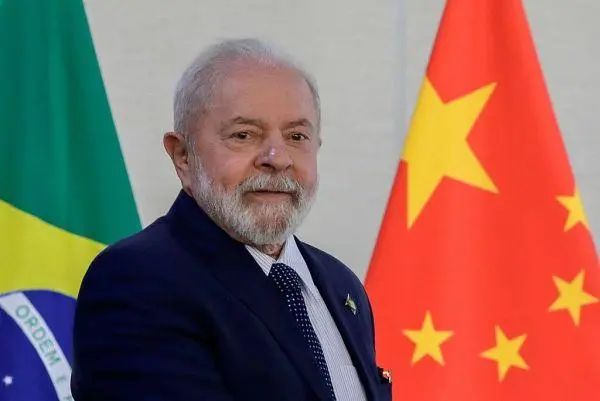发布时间:2023-04-14 作者: 丁刚
中国和巴西在气候问题上有许多共同追求。我们期待着卢拉总统的访问能够进一步推动中巴环保合作,希望双方能够共同设计和投资一些新的保护、恢复亚马逊雨林的项目。
据报道,巴西总统卢拉一行12日晚抵达上海,开展为期3天的国事访问。此次巴西总统访华团阵容堪称豪华,这背后折射出中巴关系怎样的未来?《人民日报》高级编辑、中国人民大学重阳金融研究院高级研究员丁刚就此事在4月12日《环球时报》英文版发表评论文章,人大重阳受权发布该文中英文版。
中国和巴西在气候问题上有许多共同追求。我们期待着卢拉总统的访问能够进一步推动中巴环保合作,希望双方能够共同设计和投资一些新的保护、恢复亚马逊雨林的项目。
本文字数约2300字,阅读需要4分钟。

巴西总统卢拉 资料图
巴西总统路易斯-伊纳西奥-卢拉-达席尔瓦开始访问中国,随行的还有一些内阁部长、州长、立法者和240多名商界领袖。仅看这个阵容,就可以预测中巴关系,特别是经贸关系将达到一个新的水平。
这让我想起了八年前我在巴西工作时的一个场景。我记得在一次巴西商界的聚会活动中,一个肉类和家禽业协会的负责人在发言中说:“巴西出口的不仅是牛肉、鸡肉和猪肉,还有我们的水,我们的世界级的环境”。
巴西是世界第一大牛肉和鸡肉出口国,也是世界第四大猪肉出口国。它对中国的肉类和家禽产品的出口一直在增加。
巴西肉类和家禽出口增加的一个重要因素是这些产品有优良的质量,这与它的水、草和整个饲养环境有关。巴西一直以其优良的生态环境而闻名,那里不仅有地球之肺——亚马逊雨林,还有极其严格的环境法规。
然而,近年来,亚马逊雨林砍伐量不断增加引起全球关注。根据巴西官方4月7日公布的数据,2023年第一季度亚马逊雨林的森林砍伐率是有记录以来最严重的之一,共有844平方公里的林地被毁。
国际媒体解释说,这是前总统贾伊尔-博尔索纳罗执政四年期间取消各种环境保护措施的后果,新总统卢拉需要时间来改善毁林情况。
去年11月在埃及沙姆沙伊赫举行的第27届联合国气候变化大会上,当时的巴西当选总统卢拉承诺要保护亚马逊雨林。
中国从巴西进口的主要产品,如能源、铁矿石、大豆、肉类、家禽等,都与环境有关,因此,保护巴西的环境,特别是亚马逊雨林,也是中巴经贸合作的一个组成部分。
一些西方媒体把自己打扮成环境问题的法官,把亚马逊雨林的破坏归咎于巴西向中国出口大豆和肉类产品,这是在有意掩盖西方对雨林破坏的责任。
中国作家刘仰在他编写的《中国没有榜样》一书中写道,巴西亚马逊雨林在过去近40年中消失的速度,比450年的殖民统治还要快。谁在享受所有这些资源?在巴西砍伐的树木中,50%的木材运往美国,28%运往欧洲;树木被砍伐后种植的大豆50%运往欧洲;一些土地被用来养牛,53%的牛肉运往欧洲。换句话说,亚马逊雨林消失的最大受益者是西方国家,而由于他们的消费,亚马逊雨林正在迅速消失。
根据巴西知名环境作家Flavia Milhorance收集的数据,巴西的牛肉行业被少数几家肉类加工公司控制。2019年,欧盟从三家巴西大公司购买了价值30亿美元的牛肉。而这三家公司与森林砍伐造成的二氧化碳排放有关的风险最大。这三家公司也有着对中国出口肉类产品的最大份额。
亚马逊雨林的保护面临三个主要问题。一是西方国家必须承担起他们的责任。二是巴西的肉类生产商需要改进他们的生产方式。三是巴西政府需要加强管理。但管理既要保护产业的发展,又要减少对雨林的破坏,正是在这个领域,中国和巴西的合作具有潜力。
近年来,中国的肉类进口商已经开始重视这个问题,并做出了越来越多的承诺,而在巴西投资的中国企业也在环境保护方面获得了越来越多的经验。他们严格遵守巴西的法规,承担起保护巴西生态环境的社会责任。
中国推动的许多“一带一路”项目也有了更多的环境标准,并随着环保技术和投资不断增加,制定了许多具体的实施要求和规范。
中国和巴西在气候问题上有许多共同追求。我们期待着卢拉总统的访问能够进一步推动中巴环保合作,希望双方能够共同设计和投资一些新的保护、恢复亚马逊雨林的项目。
以下为英文版
Great potential for China-Brazil cooperation on Amazon conservation
By Ding Gang
Brazilian President Luiz Inácio Lula da Silva is commencing his visit to China, accompanied by a number of cabinet ministers, state governors, legislators, and 240 business leaders. Looking at this delegation lineup alone, one can predict that China-Brazil relations, especially economic and trade relations, will reach a new level.
It reminded me of a scene when I was working in Brazil eight years ago. I remember a gathering event of the Brazilian business community where the head of an association of the meat and poultry industry said in his speech, "Brazil exports not only beef, chicken, and pork but our water, our world-class environment."
Brazil is the world's No.1 exporter of beef and chicken and the world's fourth-largest exporter of pork. Its exports of meat and poultry products to China have been on the rise.
An important factor in the increase of Brazil's meat and poultry exports is the high quality of these products, which is related to its water, grass, and overall feeding environment. Brazil has always been known for its excellent ecological environment, not only does it have the lungs of the earth, the Amazon rainforest, but also extremely strict environmental regulations.
However, in recent years, Amazon rainforest deforestation has been increasing and has caused global concern. According to Brazilian official data released on April 7, the rate of deforestation in the Amazon rainforest in the first quarter of 2023 was one of the worst on record, with a total of 844 square kilometers of forest land destroyed.
The international media explained that this was a consequence of eliminating various environmental protection measures during the four-year rule of former president Jair Bolsonaro and that it would take time for new President Lula to improve the deforestation situation.
At the 27th UN Climate Change Conference in Sharm el-Sheikh, Egypt last November, then Brazil's president-elect Lula pledged to protect the Amazon rainforest.
The main products that China imports from Brazil, such as energy, iron ore, soybeans, meat, and poultry, are all related to the environment, so protecting the Brazilian environment, especially the Amazon rainforest, is also an integral part of China-Brazil trade and economic cooperation.
By dressing up as judges of environmental issues and blaming the destruction of the Amazon rainforest on Brazil's exports of soybeans and meat products to China, some Western media are intentionally obscuring the West's responsibility for the rainforest destruction.
Chinese author Liu Yang writes in his book, China Has No Role Model, that the Brazilian Amazon rainforest has disappeared faster in the past nearly 40 years, than it did through 450 years of colonization. Who is enjoying all these resources? Of the trees cut down in Brazil, 50 percent of the timber goes to the US and 28 percent to Europe; 50 percent of the soybeans grown after the trees are cut down go to Europe; and some land is used to raise cattle, and 53 percent of the beef goes to Europe. In other words, the biggest beneficiaries of the disappearance of the Amazon rainforest are the Western countries, and because of their consumption, the Amazon rainforest is disappearing rapidly.
The Brazilian beef industry is controlled by a handful of meat processing companies, according to data collected by Flavia Milhorance, a leading Brazilian environmental author. In 2019, the European Union purchased $3 billion worth of beef from three major companies. And these three companies have the greatest risk associated with carbon dioxide emissions from deforestation. These three companies also export the largest share of meat products to China.
There are three main issues facing the conservation of the Amazon rainforest. One is that Western countries must take their share of the responsibility. Second, Brazilian meat producers need to improve their production methods. Third, the Brazilian government needs to strengthen its management. But management needs to both protect the growth of the industry and reduce the destruction of the rainforest, and it is in this area that cooperation between China and Brazil has potential.
In recent years, Chinese meat importers have begun to take this issue seriously and have made growing commitments, while Chinese companies investing in Brazil have also gained increasing experience in environmental protection. They strictly comply with Brazilian regulations and take their social responsibility to protect the ecological environment in Brazil.
Many of the Belt and Road projects promoted by China also have lived up to environmental standards, and environmental technologies and investments are increasing, setting up many specific implementation requirements and norms.
China and Brazil share many common pursuits on climate issues. We look forward to President Lula's visit to further promote China-Brazil cooperation on environmental protection. We hope both sides can jointly design and invest in projects to protect and restore the Amazon rainforest.
(欢迎关注人大重阳新浪微博:@人大重阳 ;微信公众号:rdcy2013)